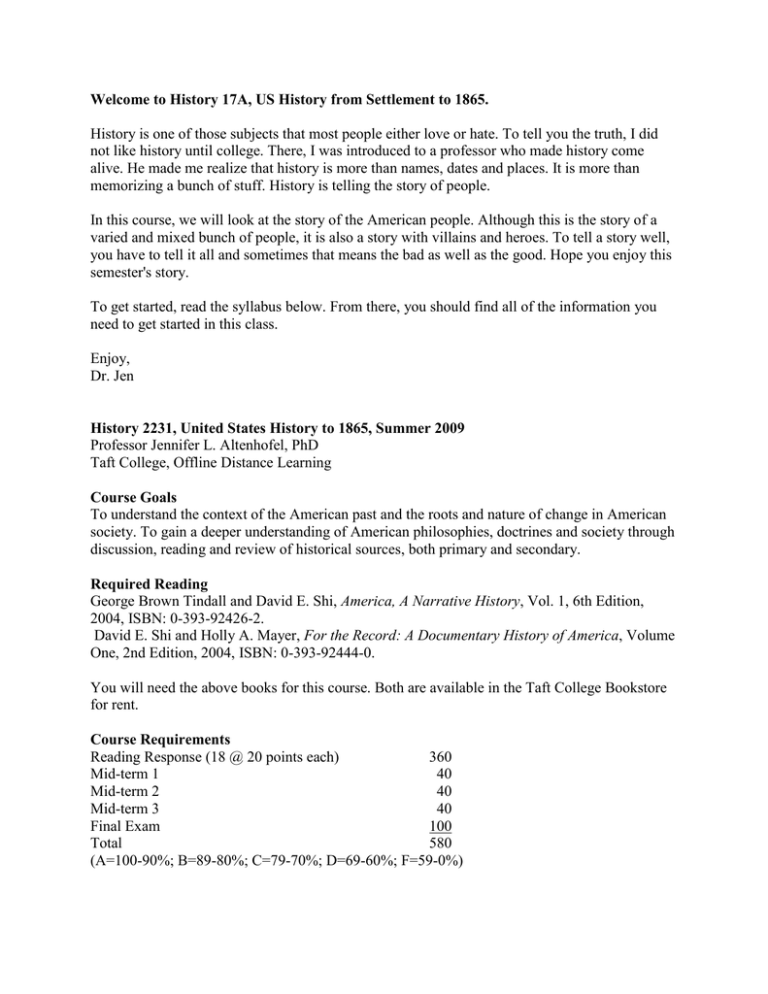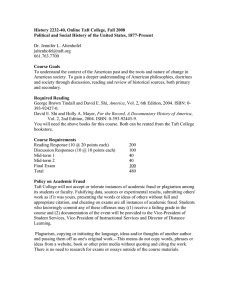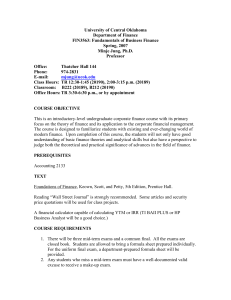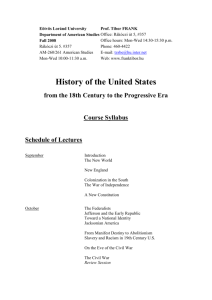Welcome to History 17A, US History from Settlement to 1865.
advertisement

Welcome to History 17A, US History from Settlement to 1865. History is one of those subjects that most people either love or hate. To tell you the truth, I did not like history until college. There, I was introduced to a professor who made history come alive. He made me realize that history is more than names, dates and places. It is more than memorizing a bunch of stuff. History is telling the story of people. In this course, we will look at the story of the American people. Although this is the story of a varied and mixed bunch of people, it is also a story with villains and heroes. To tell a story well, you have to tell it all and sometimes that means the bad as well as the good. Hope you enjoy this semester's story. To get started, read the syllabus below. From there, you should find all of the information you need to get started in this class. Enjoy, Dr. Jen History 2231, United States History to 1865, Summer 2009 Professor Jennifer L. Altenhofel, PhD Taft College, Offline Distance Learning Course Goals To understand the context of the American past and the roots and nature of change in American society. To gain a deeper understanding of American philosophies, doctrines and society through discussion, reading and review of historical sources, both primary and secondary. Required Reading George Brown Tindall and David E. Shi, America, A Narrative History, Vol. 1, 6th Edition, 2004, ISBN: 0-393-92426-2. David E. Shi and Holly A. Mayer, For the Record: A Documentary History of America, Volume One, 2nd Edition, 2004, ISBN: 0-393-92444-0. You will need the above books for this course. Both are available in the Taft College Bookstore for rent. Course Requirements Reading Response (18 @ 20 points each) 360 Mid-term 1 40 Mid-term 2 40 Mid-term 3 40 Final Exam 100 Total 580 (A=100-90%; B=89-80%; C=79-70%; D=69-60%; F=59-0%) Reading Responses from For the Record At the end of each reading in For the Record, there are a series of Review Questions. Choose five readings from each chapter and answer all of the Review Questions for each of the five readings. (This means a total of five readings per chapter not just 5 questions total.) Be sure to answer every aspect of each question thoroughly. Reading Responses for chapters 1-5 and must be taken by June 18, 2009. Reading Responses for chapters 6-10 and must be taken by July 2, 2009. Reading Responses for chapters 11-14 and must be taken by July 16, 2009. Reading Responses for chapters 15-18 and must be taken by July 30, 2009. Completed assignments may be submitted via e-mail, via USPS addressed to the college, the LRC or TCI. Policy on Academic Fraud Plagiarism, copying or initiating the language, ideas and/or thoughts of another author and passing them off as one's original work.--This means do not copy words, phrases or ideas from a website, book or other print media. There is no need to research for exams or essays outside of the course materials. Plagiarism, Fraud, deceit, trickery, sharp practice or breach of confidence by which it is sought to gain some unfair or dishonest advantage. (American College Dictionary, Random House, 1964) Taft College will not accept or tolerate instances of academic fraud or plagiarism among its students or faculty. Falsifying data, sources or experimental results, submitting others' work as if it was yours, presenting the words or ideas of others without full and appropriate citation, and cheating on exams are all instances of academic fraud. Students who knowingly commit any of these offenses will (1) receive a failing grade in the course and (2) and the instance will be reported to the Vice President of Student Services and the Director of the Distance Learning Institute. A repeated instance of academic fraud will result in a petition to have the student permanently expelled from the college. Students who may be unsure as to whether or not their writing or other work may constitute academic fraud should seek the advice of their professor prior to formal submission or presentation. Plagiarism and academic fraud are the most serious of offenses, but they are easily avoided with a modicum of care and forethought. Do not copy information from a website, book or any other media for use on an assignment or exam. The assignment or exam will receive a "0" and the student may receive an "F" in the course. Examinations The mid-terms and final exam are multiple-choice format. The final exam is comprehensive; this means the exam covers the material from the entire course. Study guides for the exams are attached to this syllabus. The first mid-term covers chapters 1-5 and must be taken by June 18, 2009 The second mid-term covers chapters 6-10 and must be taken by July 2, 2009. The third mid-term covers chapters 11-14 and must be taken by July 16, 2009. The Final exam covers chapters 15-18, is comprehensive and must be taken by July 30, 2009.




